Good Faith, Proper Purpose & Corporate Governance: A Legal Analysis
VerifiedAdded on 2022/12/22
|9
|2967
|63
Essay
AI Summary
This essay delves into the interpretation of 'good faith' and 'proper purpose' within the context of section 181 of the Corporations Act 2001 (Cth), examining their crucial role in facilitating corporate governance in Australia. It elucidates the intellectual and comprehensive nature of 'good faith,' emphasizing truthfulness, aptness, and the absence of ill motives or conflicts of interest. The paper further explores the fiduciary duties of company directors, highlighting their obligation to act in the best interests of the company and abstain from actions detrimental to its well-being. By referencing key case law such as R. v. Hodgson, ASIC v Cassimatis, and ASIC v Adler, the essay demonstrates how these principles serve as statutory mechanisms to ensure ethical conduct, accountability, and transparency in corporate management, aligning with the standards outlined in AS 8000-2003 and other corporate governance frameworks. The analysis underscores the significance of directors' actions reflecting good governance principles to protect the interests of stakeholders and maintain the integrity of the company.
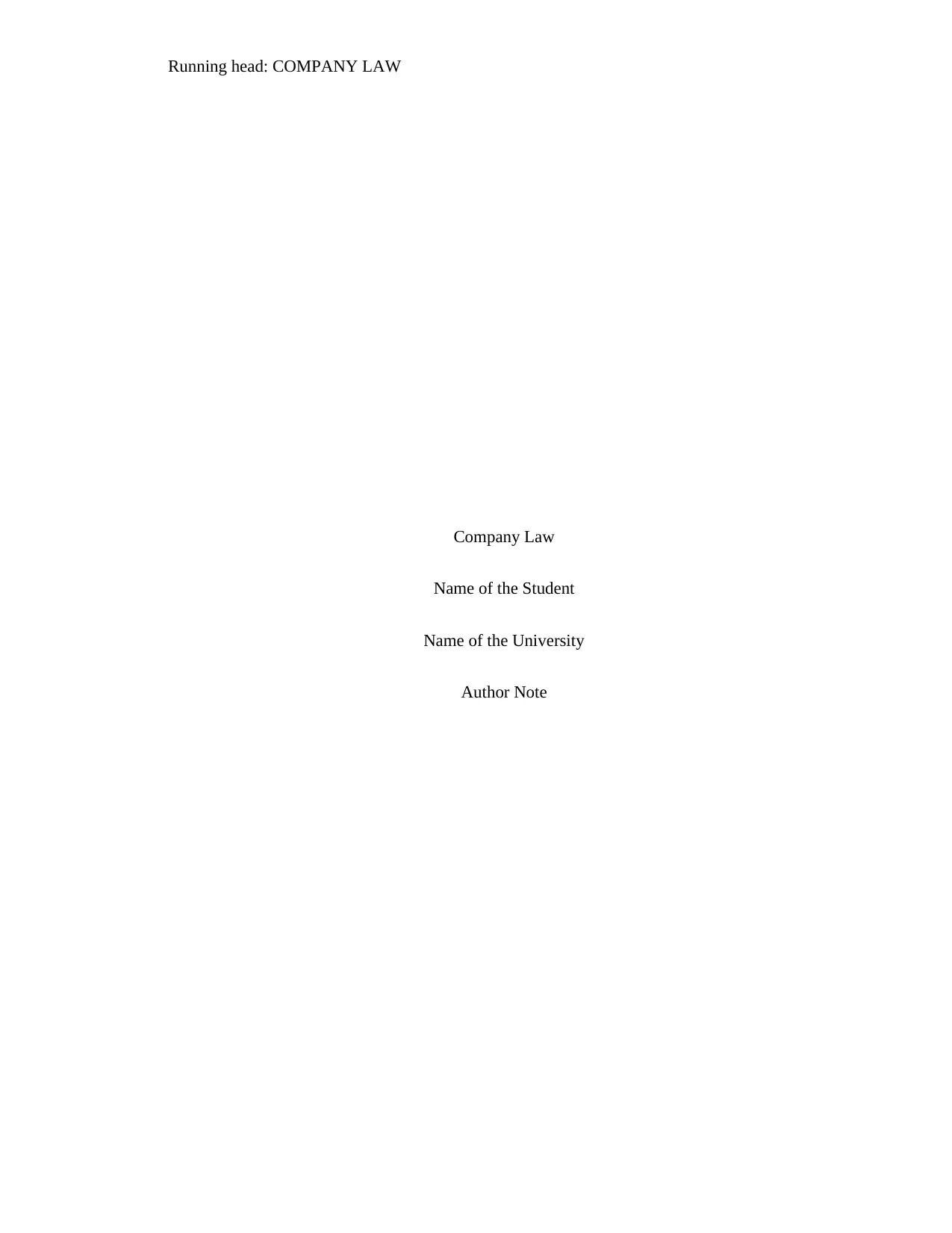
Running head: COMPANY LAW
Company Law
Name of the Student
Name of the University
Author Note
Company Law
Name of the Student
Name of the University
Author Note
Paraphrase This Document
Need a fresh take? Get an instant paraphrase of this document with our AI Paraphraser
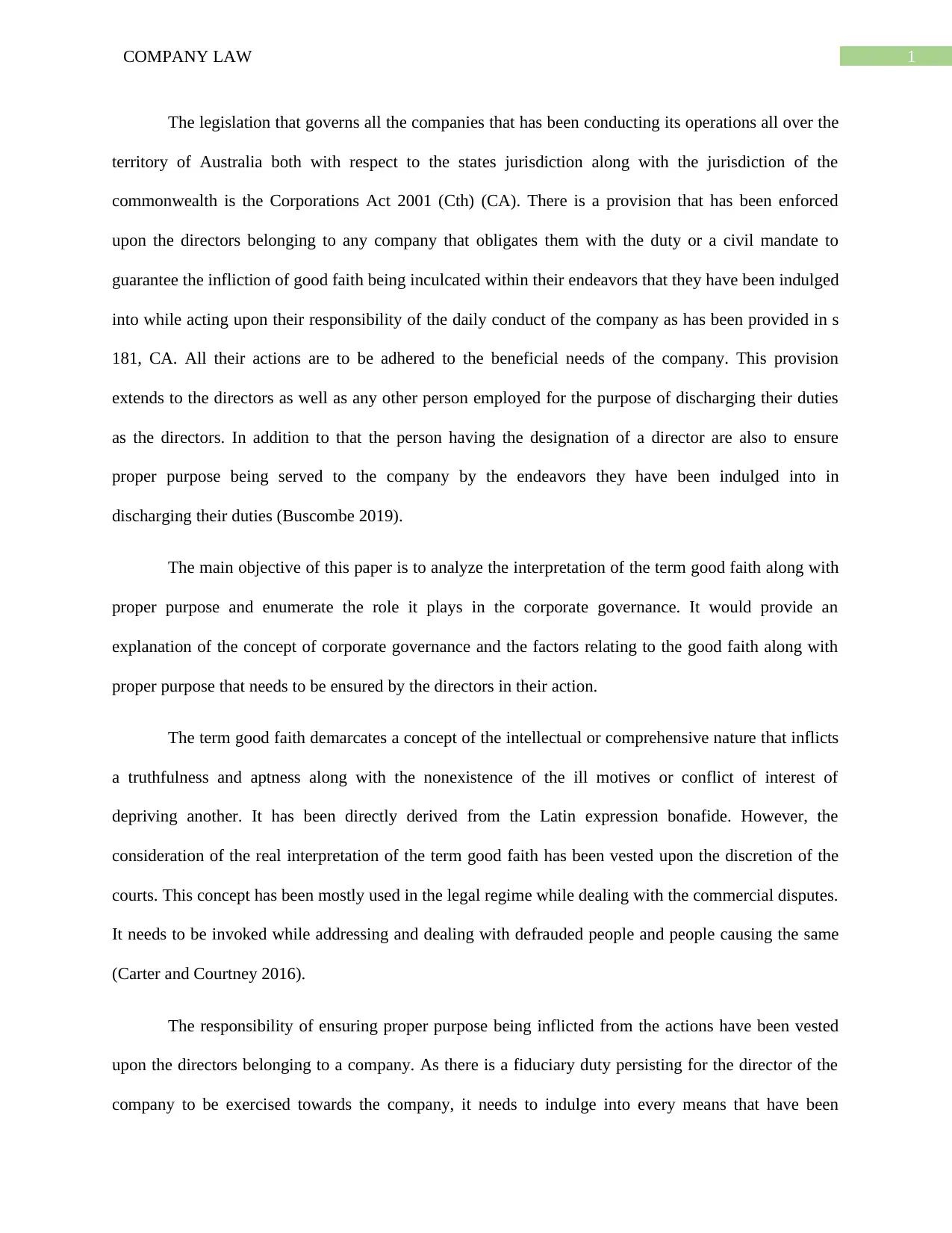
1COMPANY LAW
The legislation that governs all the companies that has been conducting its operations all over the
territory of Australia both with respect to the states jurisdiction along with the jurisdiction of the
commonwealth is the Corporations Act 2001 (Cth) (CA). There is a provision that has been enforced
upon the directors belonging to any company that obligates them with the duty or a civil mandate to
guarantee the infliction of good faith being inculcated within their endeavors that they have been indulged
into while acting upon their responsibility of the daily conduct of the company as has been provided in s
181, CA. All their actions are to be adhered to the beneficial needs of the company. This provision
extends to the directors as well as any other person employed for the purpose of discharging their duties
as the directors. In addition to that the person having the designation of a director are also to ensure
proper purpose being served to the company by the endeavors they have been indulged into in
discharging their duties (Buscombe 2019).
The main objective of this paper is to analyze the interpretation of the term good faith along with
proper purpose and enumerate the role it plays in the corporate governance. It would provide an
explanation of the concept of corporate governance and the factors relating to the good faith along with
proper purpose that needs to be ensured by the directors in their action.
The term good faith demarcates a concept of the intellectual or comprehensive nature that inflicts
a truthfulness and aptness along with the nonexistence of the ill motives or conflict of interest of
depriving another. It has been directly derived from the Latin expression bonafide. However, the
consideration of the real interpretation of the term good faith has been vested upon the discretion of the
courts. This concept has been mostly used in the legal regime while dealing with the commercial disputes.
It needs to be invoked while addressing and dealing with defrauded people and people causing the same
(Carter and Courtney 2016).
The responsibility of ensuring proper purpose being inflicted from the actions have been vested
upon the directors belonging to a company. As there is a fiduciary duty persisting for the director of the
company to be exercised towards the company, it needs to indulge into every means that have been
The legislation that governs all the companies that has been conducting its operations all over the
territory of Australia both with respect to the states jurisdiction along with the jurisdiction of the
commonwealth is the Corporations Act 2001 (Cth) (CA). There is a provision that has been enforced
upon the directors belonging to any company that obligates them with the duty or a civil mandate to
guarantee the infliction of good faith being inculcated within their endeavors that they have been indulged
into while acting upon their responsibility of the daily conduct of the company as has been provided in s
181, CA. All their actions are to be adhered to the beneficial needs of the company. This provision
extends to the directors as well as any other person employed for the purpose of discharging their duties
as the directors. In addition to that the person having the designation of a director are also to ensure
proper purpose being served to the company by the endeavors they have been indulged into in
discharging their duties (Buscombe 2019).
The main objective of this paper is to analyze the interpretation of the term good faith along with
proper purpose and enumerate the role it plays in the corporate governance. It would provide an
explanation of the concept of corporate governance and the factors relating to the good faith along with
proper purpose that needs to be ensured by the directors in their action.
The term good faith demarcates a concept of the intellectual or comprehensive nature that inflicts
a truthfulness and aptness along with the nonexistence of the ill motives or conflict of interest of
depriving another. It has been directly derived from the Latin expression bonafide. However, the
consideration of the real interpretation of the term good faith has been vested upon the discretion of the
courts. This concept has been mostly used in the legal regime while dealing with the commercial disputes.
It needs to be invoked while addressing and dealing with defrauded people and people causing the same
(Carter and Courtney 2016).
The responsibility of ensuring proper purpose being inflicted from the actions have been vested
upon the directors belonging to a company. As there is a fiduciary duty persisting for the director of the
company to be exercised towards the company, it needs to indulge into every means that have been
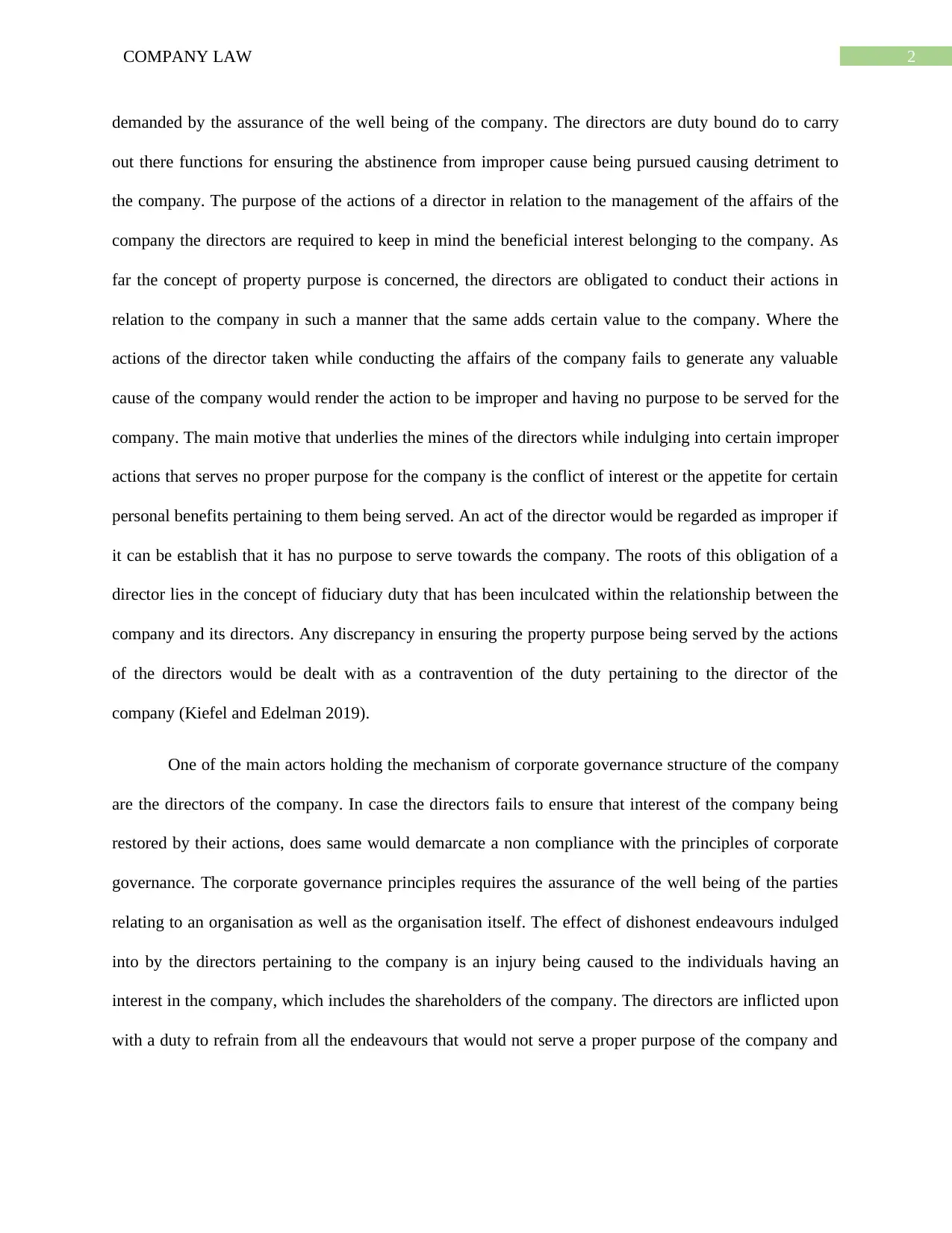
2COMPANY LAW
demanded by the assurance of the well being of the company. The directors are duty bound do to carry
out there functions for ensuring the abstinence from improper cause being pursued causing detriment to
the company. The purpose of the actions of a director in relation to the management of the affairs of the
company the directors are required to keep in mind the beneficial interest belonging to the company. As
far the concept of property purpose is concerned, the directors are obligated to conduct their actions in
relation to the company in such a manner that the same adds certain value to the company. Where the
actions of the director taken while conducting the affairs of the company fails to generate any valuable
cause of the company would render the action to be improper and having no purpose to be served for the
company. The main motive that underlies the mines of the directors while indulging into certain improper
actions that serves no proper purpose for the company is the conflict of interest or the appetite for certain
personal benefits pertaining to them being served. An act of the director would be regarded as improper if
it can be establish that it has no purpose to serve towards the company. The roots of this obligation of a
director lies in the concept of fiduciary duty that has been inculcated within the relationship between the
company and its directors. Any discrepancy in ensuring the property purpose being served by the actions
of the directors would be dealt with as a contravention of the duty pertaining to the director of the
company (Kiefel and Edelman 2019).
One of the main actors holding the mechanism of corporate governance structure of the company
are the directors of the company. In case the directors fails to ensure that interest of the company being
restored by their actions, does same would demarcate a non compliance with the principles of corporate
governance. The corporate governance principles requires the assurance of the well being of the parties
relating to an organisation as well as the organisation itself. The effect of dishonest endeavours indulged
into by the directors pertaining to the company is an injury being caused to the individuals having an
interest in the company, which includes the shareholders of the company. The directors are inflicted upon
with a duty to refrain from all the endeavours that would not serve a proper purpose of the company and
demanded by the assurance of the well being of the company. The directors are duty bound do to carry
out there functions for ensuring the abstinence from improper cause being pursued causing detriment to
the company. The purpose of the actions of a director in relation to the management of the affairs of the
company the directors are required to keep in mind the beneficial interest belonging to the company. As
far the concept of property purpose is concerned, the directors are obligated to conduct their actions in
relation to the company in such a manner that the same adds certain value to the company. Where the
actions of the director taken while conducting the affairs of the company fails to generate any valuable
cause of the company would render the action to be improper and having no purpose to be served for the
company. The main motive that underlies the mines of the directors while indulging into certain improper
actions that serves no proper purpose for the company is the conflict of interest or the appetite for certain
personal benefits pertaining to them being served. An act of the director would be regarded as improper if
it can be establish that it has no purpose to serve towards the company. The roots of this obligation of a
director lies in the concept of fiduciary duty that has been inculcated within the relationship between the
company and its directors. Any discrepancy in ensuring the property purpose being served by the actions
of the directors would be dealt with as a contravention of the duty pertaining to the director of the
company (Kiefel and Edelman 2019).
One of the main actors holding the mechanism of corporate governance structure of the company
are the directors of the company. In case the directors fails to ensure that interest of the company being
restored by their actions, does same would demarcate a non compliance with the principles of corporate
governance. The corporate governance principles requires the assurance of the well being of the parties
relating to an organisation as well as the organisation itself. The effect of dishonest endeavours indulged
into by the directors pertaining to the company is an injury being caused to the individuals having an
interest in the company, which includes the shareholders of the company. The directors are inflicted upon
with a duty to refrain from all the endeavours that would not serve a proper purpose of the company and
⊘ This is a preview!⊘
Do you want full access?
Subscribe today to unlock all pages.

Trusted by 1+ million students worldwide
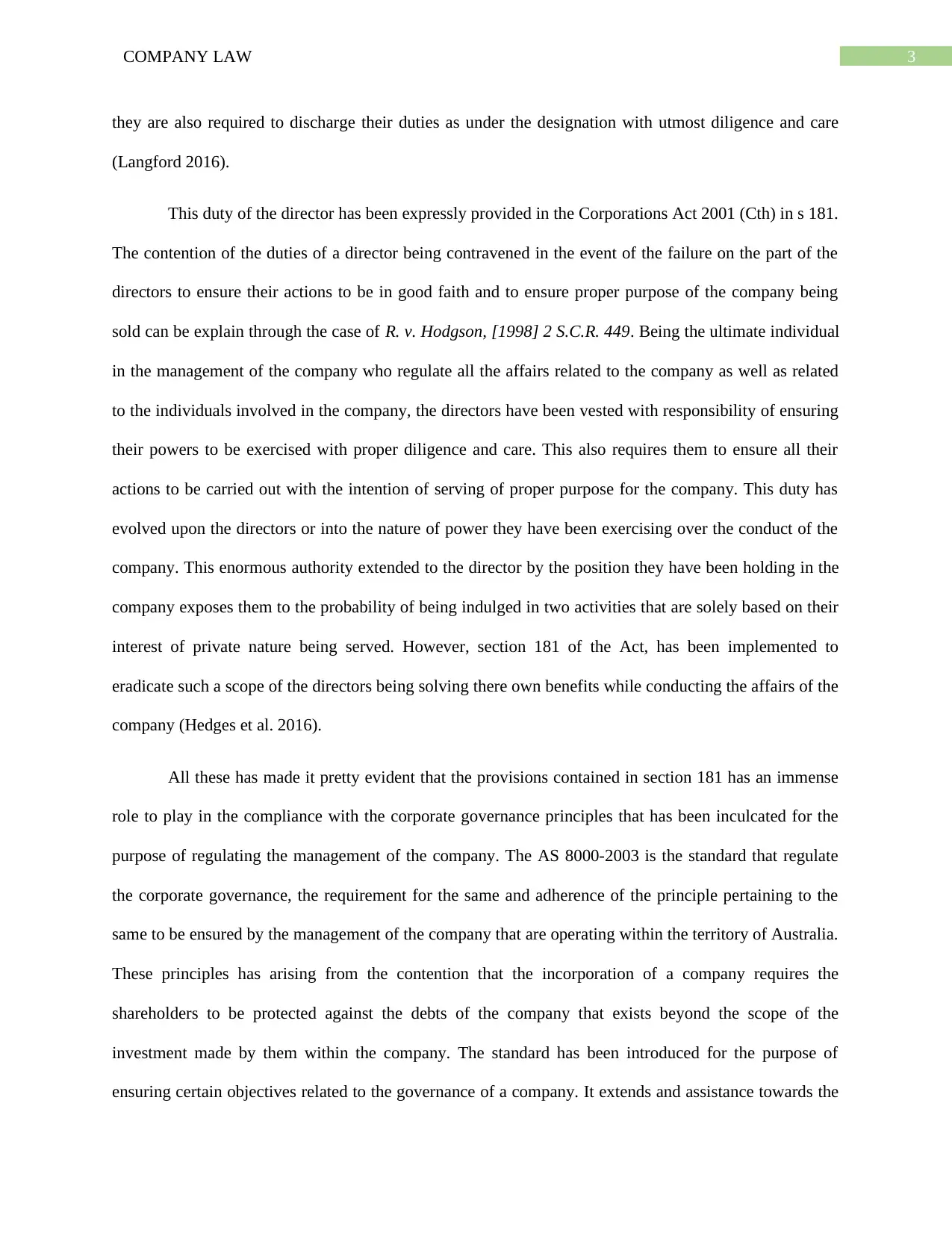
3COMPANY LAW
they are also required to discharge their duties as under the designation with utmost diligence and care
(Langford 2016).
This duty of the director has been expressly provided in the Corporations Act 2001 (Cth) in s 181.
The contention of the duties of a director being contravened in the event of the failure on the part of the
directors to ensure their actions to be in good faith and to ensure proper purpose of the company being
sold can be explain through the case of R. v. Hodgson, [1998] 2 S.C.R. 449. Being the ultimate individual
in the management of the company who regulate all the affairs related to the company as well as related
to the individuals involved in the company, the directors have been vested with responsibility of ensuring
their powers to be exercised with proper diligence and care. This also requires them to ensure all their
actions to be carried out with the intention of serving of proper purpose for the company. This duty has
evolved upon the directors or into the nature of power they have been exercising over the conduct of the
company. This enormous authority extended to the director by the position they have been holding in the
company exposes them to the probability of being indulged in two activities that are solely based on their
interest of private nature being served. However, section 181 of the Act, has been implemented to
eradicate such a scope of the directors being solving there own benefits while conducting the affairs of the
company (Hedges et al. 2016).
All these has made it pretty evident that the provisions contained in section 181 has an immense
role to play in the compliance with the corporate governance principles that has been inculcated for the
purpose of regulating the management of the company. The AS 8000-2003 is the standard that regulate
the corporate governance, the requirement for the same and adherence of the principle pertaining to the
same to be ensured by the management of the company that are operating within the territory of Australia.
These principles has arising from the contention that the incorporation of a company requires the
shareholders to be protected against the debts of the company that exists beyond the scope of the
investment made by them within the company. The standard has been introduced for the purpose of
ensuring certain objectives related to the governance of a company. It extends and assistance towards the
they are also required to discharge their duties as under the designation with utmost diligence and care
(Langford 2016).
This duty of the director has been expressly provided in the Corporations Act 2001 (Cth) in s 181.
The contention of the duties of a director being contravened in the event of the failure on the part of the
directors to ensure their actions to be in good faith and to ensure proper purpose of the company being
sold can be explain through the case of R. v. Hodgson, [1998] 2 S.C.R. 449. Being the ultimate individual
in the management of the company who regulate all the affairs related to the company as well as related
to the individuals involved in the company, the directors have been vested with responsibility of ensuring
their powers to be exercised with proper diligence and care. This also requires them to ensure all their
actions to be carried out with the intention of serving of proper purpose for the company. This duty has
evolved upon the directors or into the nature of power they have been exercising over the conduct of the
company. This enormous authority extended to the director by the position they have been holding in the
company exposes them to the probability of being indulged in two activities that are solely based on their
interest of private nature being served. However, section 181 of the Act, has been implemented to
eradicate such a scope of the directors being solving there own benefits while conducting the affairs of the
company (Hedges et al. 2016).
All these has made it pretty evident that the provisions contained in section 181 has an immense
role to play in the compliance with the corporate governance principles that has been inculcated for the
purpose of regulating the management of the company. The AS 8000-2003 is the standard that regulate
the corporate governance, the requirement for the same and adherence of the principle pertaining to the
same to be ensured by the management of the company that are operating within the territory of Australia.
These principles has arising from the contention that the incorporation of a company requires the
shareholders to be protected against the debts of the company that exists beyond the scope of the
investment made by them within the company. The standard has been introduced for the purpose of
ensuring certain objectives related to the governance of a company. It extends and assistance towards the
Paraphrase This Document
Need a fresh take? Get an instant paraphrase of this document with our AI Paraphraser
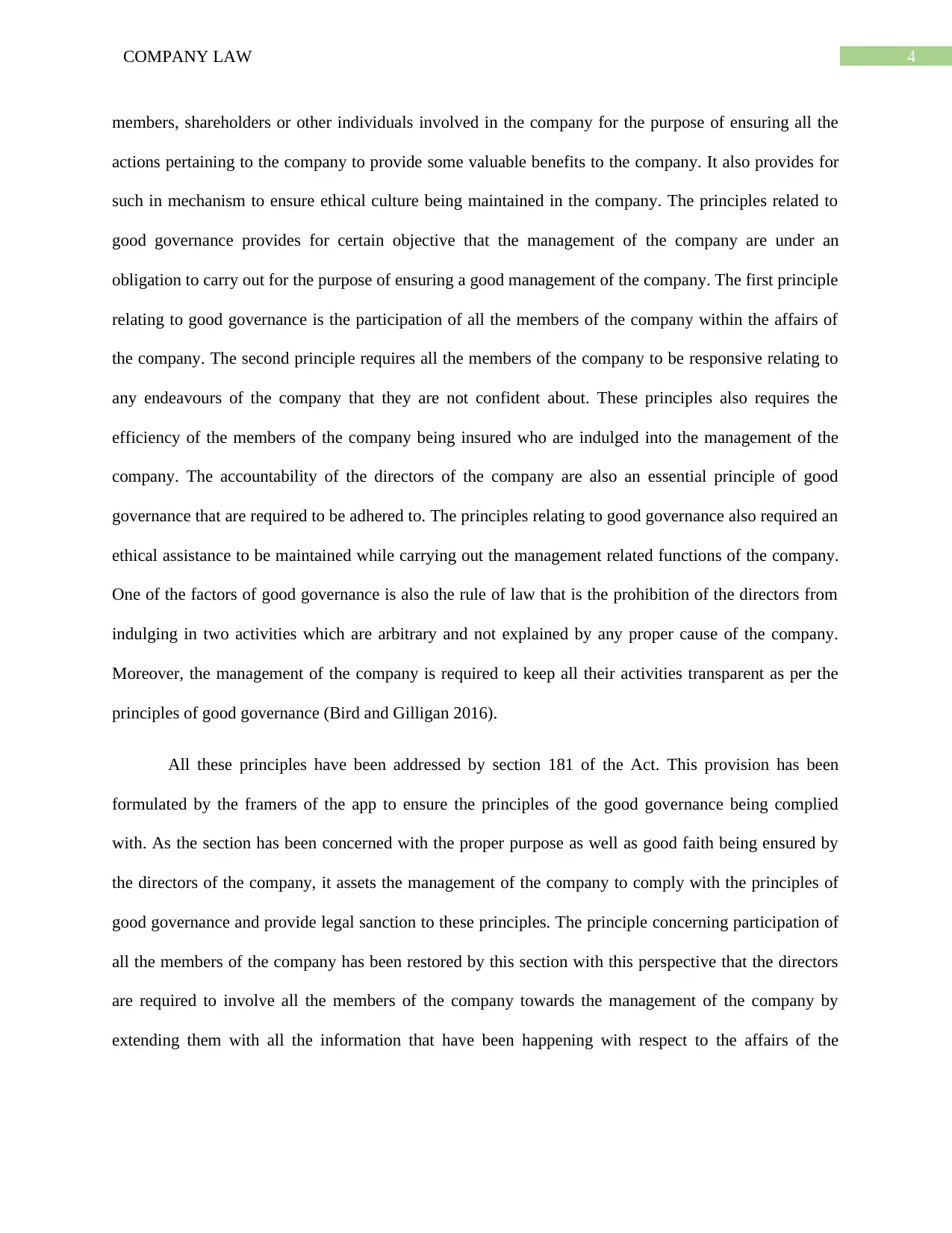
4COMPANY LAW
members, shareholders or other individuals involved in the company for the purpose of ensuring all the
actions pertaining to the company to provide some valuable benefits to the company. It also provides for
such in mechanism to ensure ethical culture being maintained in the company. The principles related to
good governance provides for certain objective that the management of the company are under an
obligation to carry out for the purpose of ensuring a good management of the company. The first principle
relating to good governance is the participation of all the members of the company within the affairs of
the company. The second principle requires all the members of the company to be responsive relating to
any endeavours of the company that they are not confident about. These principles also requires the
efficiency of the members of the company being insured who are indulged into the management of the
company. The accountability of the directors of the company are also an essential principle of good
governance that are required to be adhered to. The principles relating to good governance also required an
ethical assistance to be maintained while carrying out the management related functions of the company.
One of the factors of good governance is also the rule of law that is the prohibition of the directors from
indulging in two activities which are arbitrary and not explained by any proper cause of the company.
Moreover, the management of the company is required to keep all their activities transparent as per the
principles of good governance (Bird and Gilligan 2016).
All these principles have been addressed by section 181 of the Act. This provision has been
formulated by the framers of the app to ensure the principles of the good governance being complied
with. As the section has been concerned with the proper purpose as well as good faith being ensured by
the directors of the company, it assets the management of the company to comply with the principles of
good governance and provide legal sanction to these principles. The principle concerning participation of
all the members of the company has been restored by this section with this perspective that the directors
are required to involve all the members of the company towards the management of the company by
extending them with all the information that have been happening with respect to the affairs of the
members, shareholders or other individuals involved in the company for the purpose of ensuring all the
actions pertaining to the company to provide some valuable benefits to the company. It also provides for
such in mechanism to ensure ethical culture being maintained in the company. The principles related to
good governance provides for certain objective that the management of the company are under an
obligation to carry out for the purpose of ensuring a good management of the company. The first principle
relating to good governance is the participation of all the members of the company within the affairs of
the company. The second principle requires all the members of the company to be responsive relating to
any endeavours of the company that they are not confident about. These principles also requires the
efficiency of the members of the company being insured who are indulged into the management of the
company. The accountability of the directors of the company are also an essential principle of good
governance that are required to be adhered to. The principles relating to good governance also required an
ethical assistance to be maintained while carrying out the management related functions of the company.
One of the factors of good governance is also the rule of law that is the prohibition of the directors from
indulging in two activities which are arbitrary and not explained by any proper cause of the company.
Moreover, the management of the company is required to keep all their activities transparent as per the
principles of good governance (Bird and Gilligan 2016).
All these principles have been addressed by section 181 of the Act. This provision has been
formulated by the framers of the app to ensure the principles of the good governance being complied
with. As the section has been concerned with the proper purpose as well as good faith being ensured by
the directors of the company, it assets the management of the company to comply with the principles of
good governance and provide legal sanction to these principles. The principle concerning participation of
all the members of the company has been restored by this section with this perspective that the directors
are required to involve all the members of the company towards the management of the company by
extending them with all the information that have been happening with respect to the affairs of the
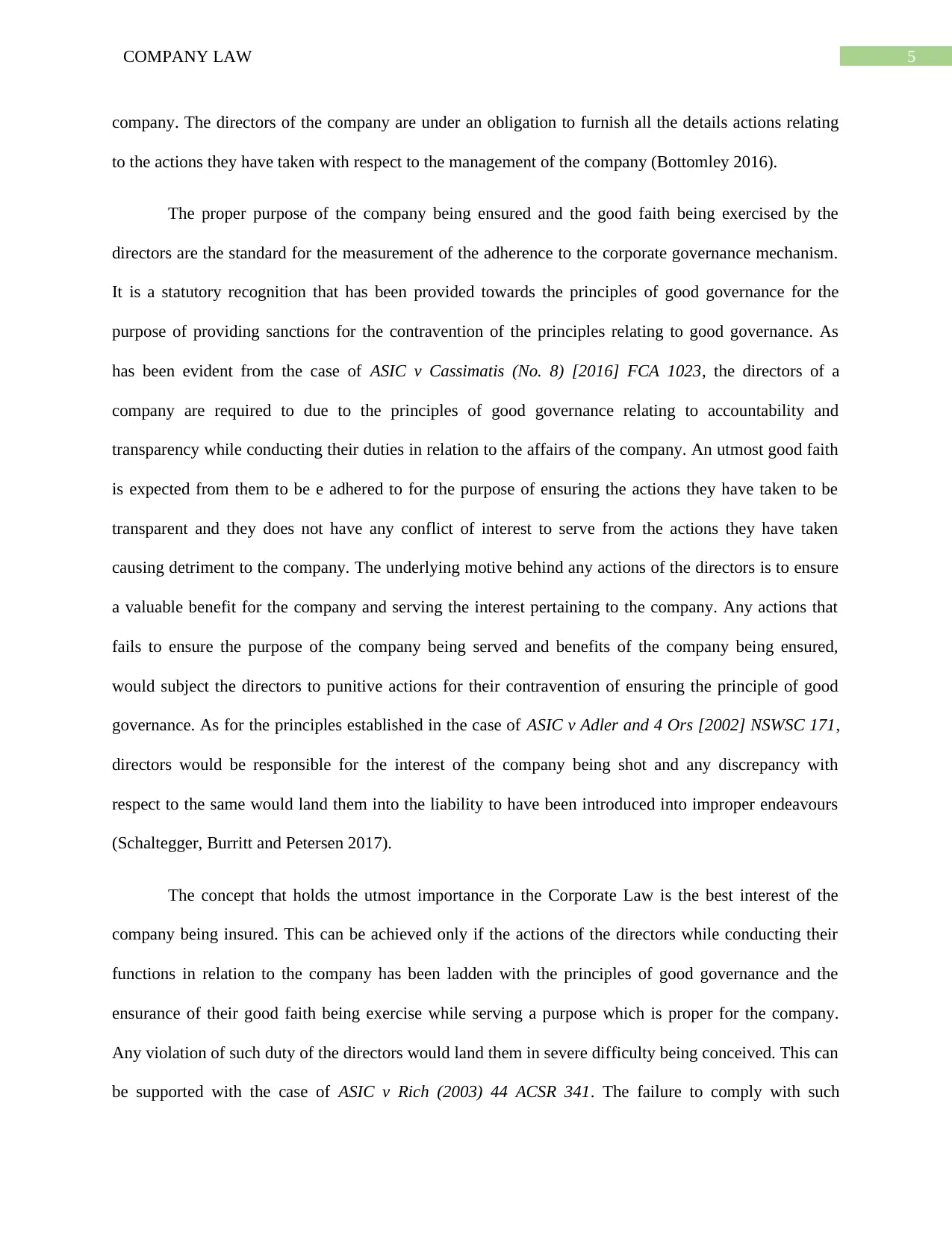
5COMPANY LAW
company. The directors of the company are under an obligation to furnish all the details actions relating
to the actions they have taken with respect to the management of the company (Bottomley 2016).
The proper purpose of the company being ensured and the good faith being exercised by the
directors are the standard for the measurement of the adherence to the corporate governance mechanism.
It is a statutory recognition that has been provided towards the principles of good governance for the
purpose of providing sanctions for the contravention of the principles relating to good governance. As
has been evident from the case of ASIC v Cassimatis (No. 8) [2016] FCA 1023, the directors of a
company are required to due to the principles of good governance relating to accountability and
transparency while conducting their duties in relation to the affairs of the company. An utmost good faith
is expected from them to be e adhered to for the purpose of ensuring the actions they have taken to be
transparent and they does not have any conflict of interest to serve from the actions they have taken
causing detriment to the company. The underlying motive behind any actions of the directors is to ensure
a valuable benefit for the company and serving the interest pertaining to the company. Any actions that
fails to ensure the purpose of the company being served and benefits of the company being ensured,
would subject the directors to punitive actions for their contravention of ensuring the principle of good
governance. As for the principles established in the case of ASIC v Adler and 4 Ors [2002] NSWSC 171,
directors would be responsible for the interest of the company being shot and any discrepancy with
respect to the same would land them into the liability to have been introduced into improper endeavours
(Schaltegger, Burritt and Petersen 2017).
The concept that holds the utmost importance in the Corporate Law is the best interest of the
company being insured. This can be achieved only if the actions of the directors while conducting their
functions in relation to the company has been ladden with the principles of good governance and the
ensurance of their good faith being exercise while serving a purpose which is proper for the company.
Any violation of such duty of the directors would land them in severe difficulty being conceived. This can
be supported with the case of ASIC v Rich (2003) 44 ACSR 341. The failure to comply with such
company. The directors of the company are under an obligation to furnish all the details actions relating
to the actions they have taken with respect to the management of the company (Bottomley 2016).
The proper purpose of the company being ensured and the good faith being exercised by the
directors are the standard for the measurement of the adherence to the corporate governance mechanism.
It is a statutory recognition that has been provided towards the principles of good governance for the
purpose of providing sanctions for the contravention of the principles relating to good governance. As
has been evident from the case of ASIC v Cassimatis (No. 8) [2016] FCA 1023, the directors of a
company are required to due to the principles of good governance relating to accountability and
transparency while conducting their duties in relation to the affairs of the company. An utmost good faith
is expected from them to be e adhered to for the purpose of ensuring the actions they have taken to be
transparent and they does not have any conflict of interest to serve from the actions they have taken
causing detriment to the company. The underlying motive behind any actions of the directors is to ensure
a valuable benefit for the company and serving the interest pertaining to the company. Any actions that
fails to ensure the purpose of the company being served and benefits of the company being ensured,
would subject the directors to punitive actions for their contravention of ensuring the principle of good
governance. As for the principles established in the case of ASIC v Adler and 4 Ors [2002] NSWSC 171,
directors would be responsible for the interest of the company being shot and any discrepancy with
respect to the same would land them into the liability to have been introduced into improper endeavours
(Schaltegger, Burritt and Petersen 2017).
The concept that holds the utmost importance in the Corporate Law is the best interest of the
company being insured. This can be achieved only if the actions of the directors while conducting their
functions in relation to the company has been ladden with the principles of good governance and the
ensurance of their good faith being exercise while serving a purpose which is proper for the company.
Any violation of such duty of the directors would land them in severe difficulty being conceived. This can
be supported with the case of ASIC v Rich (2003) 44 ACSR 341. The failure to comply with such
⊘ This is a preview!⊘
Do you want full access?
Subscribe today to unlock all pages.

Trusted by 1+ million students worldwide
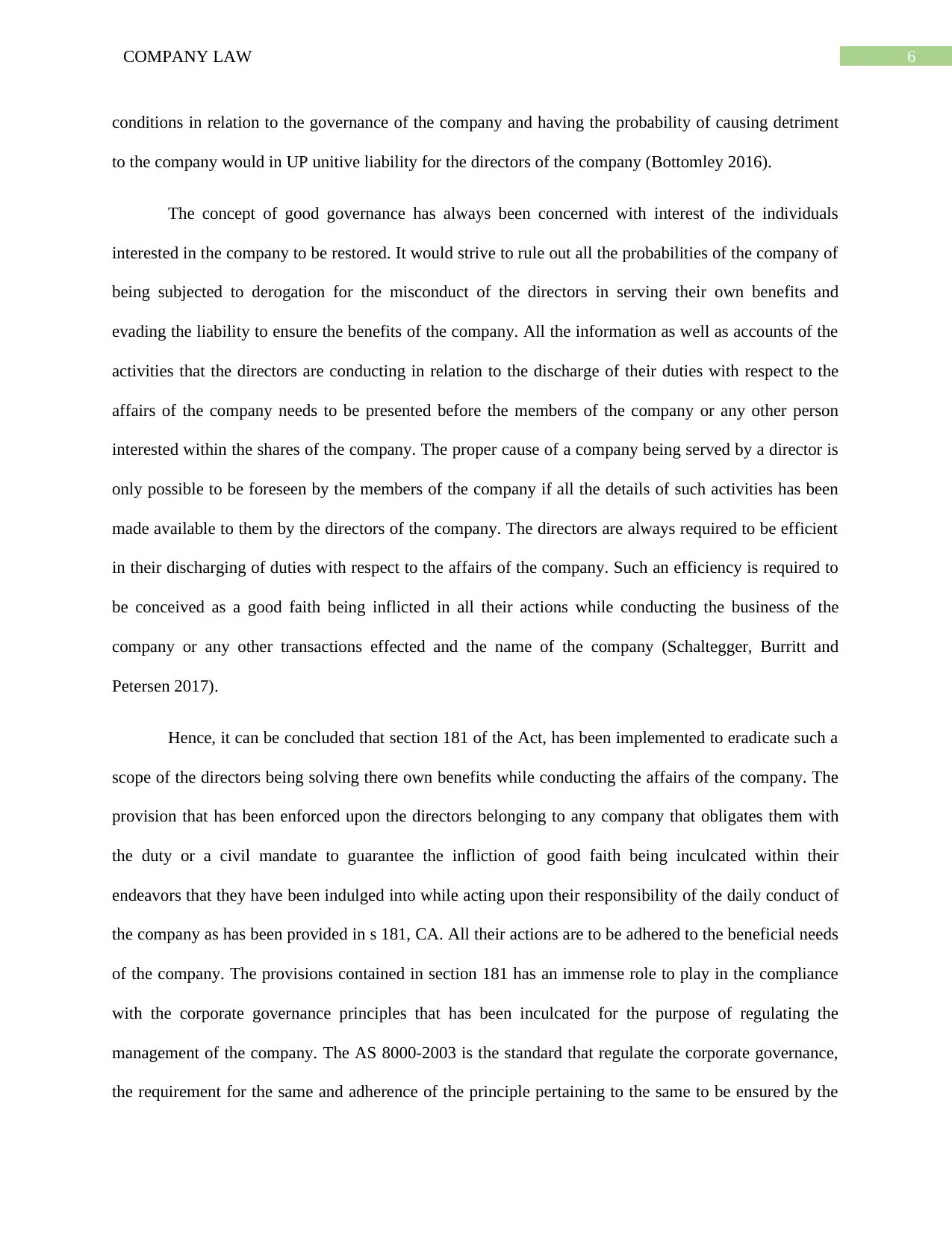
6COMPANY LAW
conditions in relation to the governance of the company and having the probability of causing detriment
to the company would in UP unitive liability for the directors of the company (Bottomley 2016).
The concept of good governance has always been concerned with interest of the individuals
interested in the company to be restored. It would strive to rule out all the probabilities of the company of
being subjected to derogation for the misconduct of the directors in serving their own benefits and
evading the liability to ensure the benefits of the company. All the information as well as accounts of the
activities that the directors are conducting in relation to the discharge of their duties with respect to the
affairs of the company needs to be presented before the members of the company or any other person
interested within the shares of the company. The proper cause of a company being served by a director is
only possible to be foreseen by the members of the company if all the details of such activities has been
made available to them by the directors of the company. The directors are always required to be efficient
in their discharging of duties with respect to the affairs of the company. Such an efficiency is required to
be conceived as a good faith being inflicted in all their actions while conducting the business of the
company or any other transactions effected and the name of the company (Schaltegger, Burritt and
Petersen 2017).
Hence, it can be concluded that section 181 of the Act, has been implemented to eradicate such a
scope of the directors being solving there own benefits while conducting the affairs of the company. The
provision that has been enforced upon the directors belonging to any company that obligates them with
the duty or a civil mandate to guarantee the infliction of good faith being inculcated within their
endeavors that they have been indulged into while acting upon their responsibility of the daily conduct of
the company as has been provided in s 181, CA. All their actions are to be adhered to the beneficial needs
of the company. The provisions contained in section 181 has an immense role to play in the compliance
with the corporate governance principles that has been inculcated for the purpose of regulating the
management of the company. The AS 8000-2003 is the standard that regulate the corporate governance,
the requirement for the same and adherence of the principle pertaining to the same to be ensured by the
conditions in relation to the governance of the company and having the probability of causing detriment
to the company would in UP unitive liability for the directors of the company (Bottomley 2016).
The concept of good governance has always been concerned with interest of the individuals
interested in the company to be restored. It would strive to rule out all the probabilities of the company of
being subjected to derogation for the misconduct of the directors in serving their own benefits and
evading the liability to ensure the benefits of the company. All the information as well as accounts of the
activities that the directors are conducting in relation to the discharge of their duties with respect to the
affairs of the company needs to be presented before the members of the company or any other person
interested within the shares of the company. The proper cause of a company being served by a director is
only possible to be foreseen by the members of the company if all the details of such activities has been
made available to them by the directors of the company. The directors are always required to be efficient
in their discharging of duties with respect to the affairs of the company. Such an efficiency is required to
be conceived as a good faith being inflicted in all their actions while conducting the business of the
company or any other transactions effected and the name of the company (Schaltegger, Burritt and
Petersen 2017).
Hence, it can be concluded that section 181 of the Act, has been implemented to eradicate such a
scope of the directors being solving there own benefits while conducting the affairs of the company. The
provision that has been enforced upon the directors belonging to any company that obligates them with
the duty or a civil mandate to guarantee the infliction of good faith being inculcated within their
endeavors that they have been indulged into while acting upon their responsibility of the daily conduct of
the company as has been provided in s 181, CA. All their actions are to be adhered to the beneficial needs
of the company. The provisions contained in section 181 has an immense role to play in the compliance
with the corporate governance principles that has been inculcated for the purpose of regulating the
management of the company. The AS 8000-2003 is the standard that regulate the corporate governance,
the requirement for the same and adherence of the principle pertaining to the same to be ensured by the
Paraphrase This Document
Need a fresh take? Get an instant paraphrase of this document with our AI Paraphraser
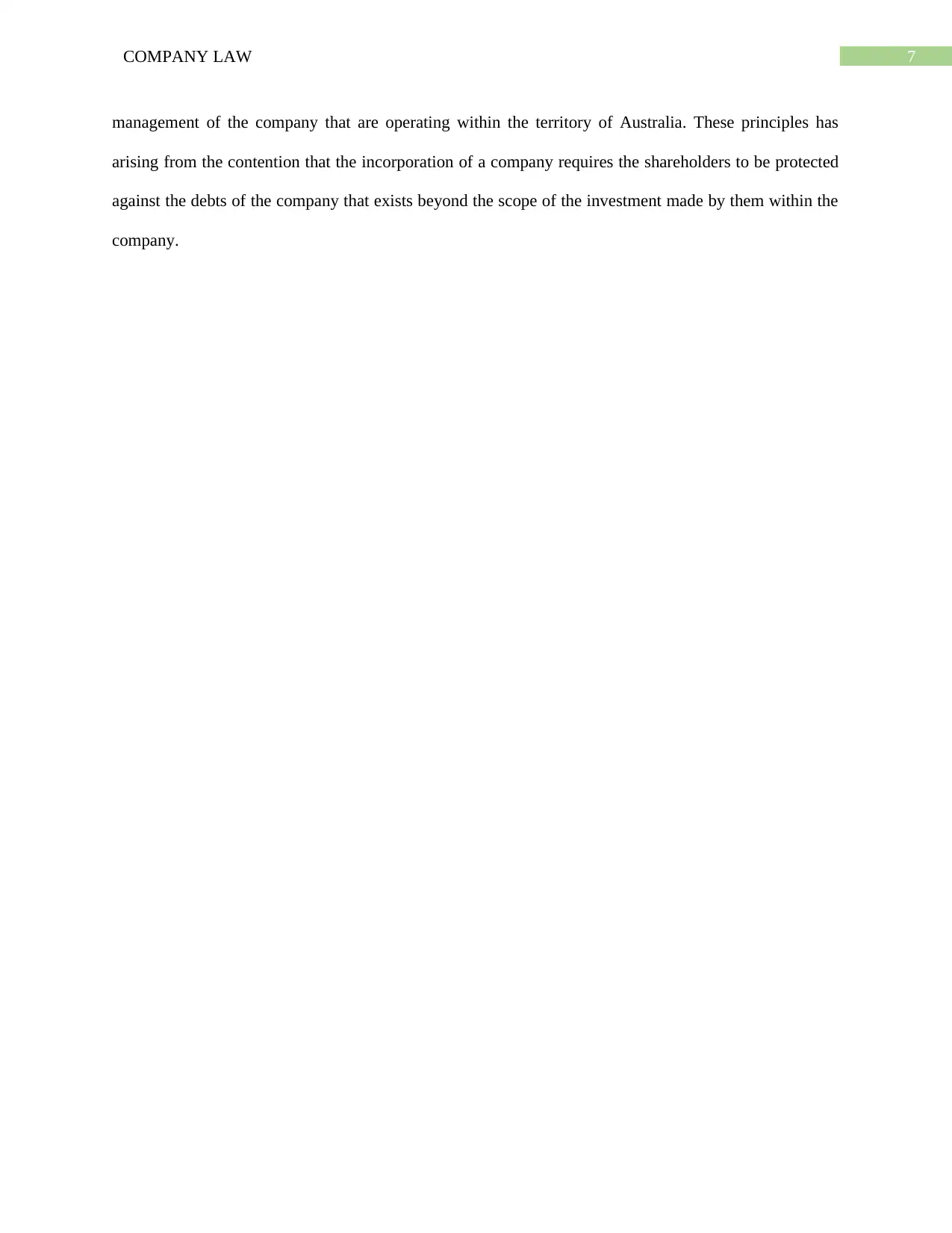
7COMPANY LAW
management of the company that are operating within the territory of Australia. These principles has
arising from the contention that the incorporation of a company requires the shareholders to be protected
against the debts of the company that exists beyond the scope of the investment made by them within the
company.
management of the company that are operating within the territory of Australia. These principles has
arising from the contention that the incorporation of a company requires the shareholders to be protected
against the debts of the company that exists beyond the scope of the investment made by them within the
company.
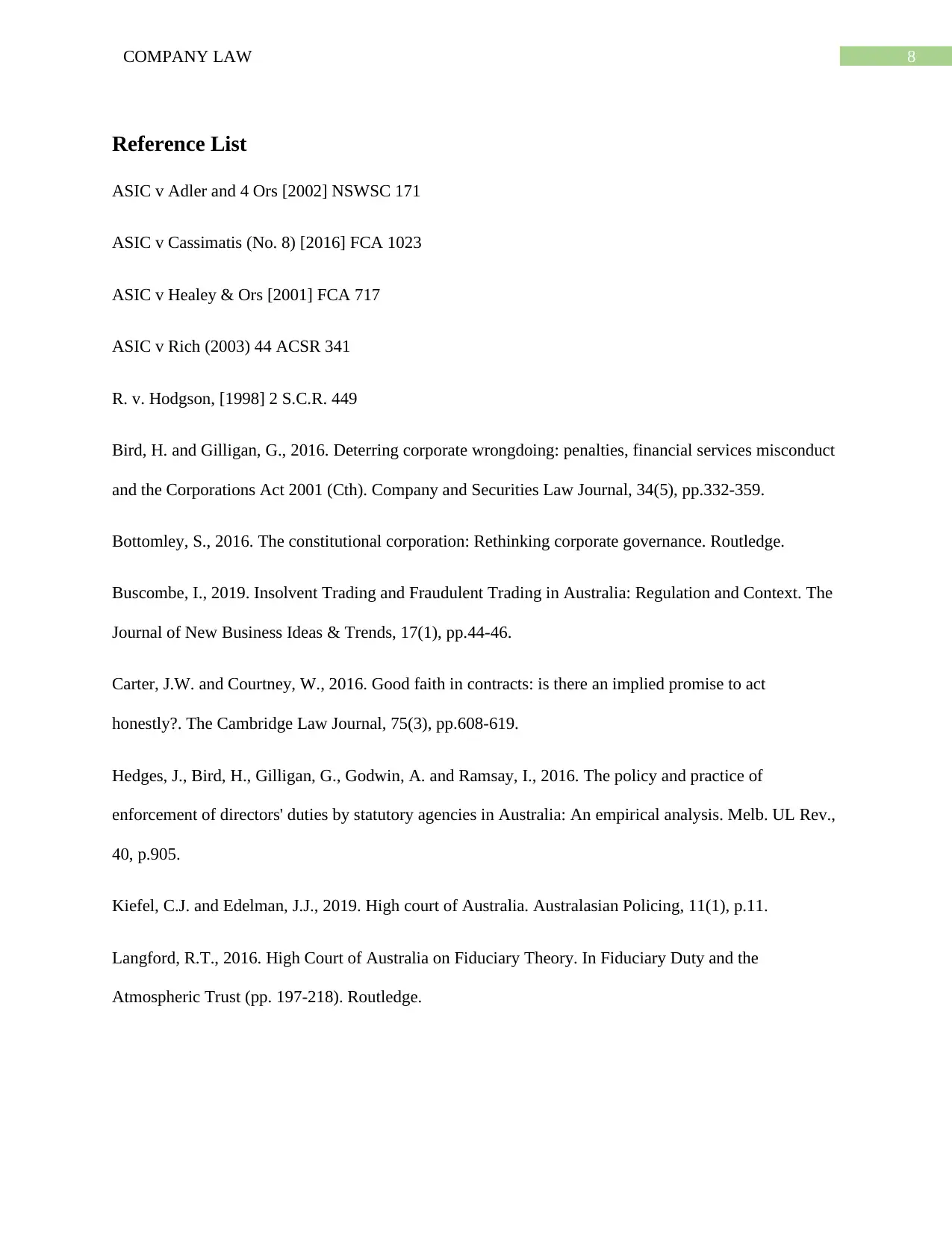
8COMPANY LAW
Reference List
ASIC v Adler and 4 Ors [2002] NSWSC 171
ASIC v Cassimatis (No. 8) [2016] FCA 1023
ASIC v Healey & Ors [2001] FCA 717
ASIC v Rich (2003) 44 ACSR 341
R. v. Hodgson, [1998] 2 S.C.R. 449
Bird, H. and Gilligan, G., 2016. Deterring corporate wrongdoing: penalties, financial services misconduct
and the Corporations Act 2001 (Cth). Company and Securities Law Journal, 34(5), pp.332-359.
Bottomley, S., 2016. The constitutional corporation: Rethinking corporate governance. Routledge.
Buscombe, I., 2019. Insolvent Trading and Fraudulent Trading in Australia: Regulation and Context. The
Journal of New Business Ideas & Trends, 17(1), pp.44-46.
Carter, J.W. and Courtney, W., 2016. Good faith in contracts: is there an implied promise to act
honestly?. The Cambridge Law Journal, 75(3), pp.608-619.
Hedges, J., Bird, H., Gilligan, G., Godwin, A. and Ramsay, I., 2016. The policy and practice of
enforcement of directors' duties by statutory agencies in Australia: An empirical analysis. Melb. UL Rev.,
40, p.905.
Kiefel, C.J. and Edelman, J.J., 2019. High court of Australia. Australasian Policing, 11(1), p.11.
Langford, R.T., 2016. High Court of Australia on Fiduciary Theory. In Fiduciary Duty and the
Atmospheric Trust (pp. 197-218). Routledge.
Reference List
ASIC v Adler and 4 Ors [2002] NSWSC 171
ASIC v Cassimatis (No. 8) [2016] FCA 1023
ASIC v Healey & Ors [2001] FCA 717
ASIC v Rich (2003) 44 ACSR 341
R. v. Hodgson, [1998] 2 S.C.R. 449
Bird, H. and Gilligan, G., 2016. Deterring corporate wrongdoing: penalties, financial services misconduct
and the Corporations Act 2001 (Cth). Company and Securities Law Journal, 34(5), pp.332-359.
Bottomley, S., 2016. The constitutional corporation: Rethinking corporate governance. Routledge.
Buscombe, I., 2019. Insolvent Trading and Fraudulent Trading in Australia: Regulation and Context. The
Journal of New Business Ideas & Trends, 17(1), pp.44-46.
Carter, J.W. and Courtney, W., 2016. Good faith in contracts: is there an implied promise to act
honestly?. The Cambridge Law Journal, 75(3), pp.608-619.
Hedges, J., Bird, H., Gilligan, G., Godwin, A. and Ramsay, I., 2016. The policy and practice of
enforcement of directors' duties by statutory agencies in Australia: An empirical analysis. Melb. UL Rev.,
40, p.905.
Kiefel, C.J. and Edelman, J.J., 2019. High court of Australia. Australasian Policing, 11(1), p.11.
Langford, R.T., 2016. High Court of Australia on Fiduciary Theory. In Fiduciary Duty and the
Atmospheric Trust (pp. 197-218). Routledge.
⊘ This is a preview!⊘
Do you want full access?
Subscribe today to unlock all pages.

Trusted by 1+ million students worldwide
1 out of 9
Related Documents
Your All-in-One AI-Powered Toolkit for Academic Success.
+13062052269
info@desklib.com
Available 24*7 on WhatsApp / Email
![[object Object]](/_next/static/media/star-bottom.7253800d.svg)
Unlock your academic potential
Copyright © 2020–2025 A2Z Services. All Rights Reserved. Developed and managed by ZUCOL.





